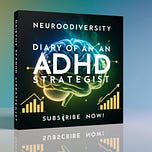The Breakfast Battlefield
Every morning was the same frustrating routine for Marcus. He'd start with the best intentions—coffee in hand, to-do list ready—but by 10 AM, his focus would crash and burn.
As someone diagnosed with ADHD in adulthood, Marcus had tried medication, meditation, and every productivity hack available, but never considered that what he ate might be sabotaging his cognitive function daily.
"I was eating sugary cereal and downing energy drinks, then wondering why I couldn't maintain focus for more than minutes," Marcus recalls. His breakthrough came when a specialist suggested examining his diet—not just as fuel, but as a fundamental brain chemistry modifier.
might be sabotaging his cognitive function daily
Breaking It Down: What's This All About?
The ADHD diet isn't just another eating plan—it's a strategic approach to feeding your brain the specific nutrients it needs to optimize dopamine production, stabilize glucose levels, and support neurotransmitter function and balance. Unlike typical diets focusing primarily on weight, the ADHD nutrition approach targets cognitive performance, attention regulation, and mental clarity specifically.
Why This Matters
For the 4-5% of adults worldwide living with ADHD, daily functioning often feels like an uphill battle against your own brain circuitry. Traditional treatments focus heavily on medication, which while effective, addresses only part of the complex puzzle.
What you eat directly impacts how neurotransmitters like dopamine—often depleted in ADHD brains—are produced and regulated in your neurological system daily. The right nutritional approach can potentially reduce symptom severity, enhance medication effectiveness, and provide natural support for improved cognitive function.
Diet modifications aren't meant to replace established treatments but rather complement them to create a comprehensive approach to managing ADHD effectively.
4-5% of adults worldwide living with ADHD, daily functioning
The Science Behind It
Research increasingly supports the connection between diet and ADHD symptom management. A 2019 study published in the Journal of Attention Disorders found that Mediterranean-style diets rich in omega-3 fatty acids were associated with improved attention and reduced impulsivity in ADHD study participants.
The brain-gut connection plays a crucial role here. A 2021 review in Nutrients journal revealed that gut microbiome composition directly influences neurotransmitter production, potentially impacting ADHD symptom expression significantly. Refined sugars and highly processed foods have been shown to disrupt this delicate balance, while whole foods support optimal neural communication.
Protein intake deserves special attention. A 2018 study in the International Journal of Environmental Research and Public Health demonstrated that protein-rich breakfasts significantly improved sustained attention and working memory in adolescents with ADHD compared significantly to high-carbohydrate morning meals.
The timing of meals also matters. Research published in Frontiers in Human Neuroscience suggests that irregular eating patterns can exacerbate ADHD symptoms by disrupting circadian rhythms and metabolic regulation processes.
The timing of meals also matters. Research published
Making It Work: How to Apply This in Real Life
✅ Start With Protein – Begin each day with at least 20g of protein (eggs, Greek yogurt, or a smoothie with protein powder). This provides the amino acids needed for dopamine production and stabilizes blood sugar levels all morning.
✅ Love Healthy Fats – Incorporate omega-3 rich foods daily (fatty fish, walnuts, flaxseeds). These fats are essential building blocks for brain cell membranes and neural communication pathway development.
✅ Stabilize Blood Sugar – Eat regular meals combining protein, complex carbs, and healthy fats every 3-4 hours to prevent glucose spikes and crashes that worsen attention and focus.
✅ Identify Sensitivities – Consider a two-week elimination of common trigger foods (gluten, dairy, artificial additives) to determine if they affect your specific symptoms negatively.
✅ Strategic Supplementation – After consulting healthcare providers, consider supplements like omega-3s, zinc, magnesium, and vitamin D, which research suggests may support ADHD brain function.
Real-Life Examples in Action
After implementing these dietary changes, Marcus discovered that his morning routine transformation yielded remarkable results. He replaced sugary cereal with eggs, avocado, and whole-grain toast, and within weeks noticed his focus extending well into the afternoon hours.
"The 2 PM crash just disappeared," he explains. "I'm not saying food fixed my ADHD, but it definitely turned down the volume on my symptoms and made my medication work much more effectively."
Software developer Priya found that eliminating artificial food colorings and preservatives dramatically reduced her son's hyperactivity. "We didn't believe it until we tried it," she shares. "The difference in his classroom behavior was noticed by his teachers before we even told them about the dietary changes."
Financial analyst Jerome discovered that intermittent fasting worsened his ADHD symptoms significantly. "I needed more regular meals with protein to keep my brain functioning. Once I started eating every 3-4 hours, my productivity at work improved by nearly 40%."
Pro Tips & Insider Insights
🧠 Don't attempt a complete diet overhaul overnight. Start with breakfast optimization to set up your neurotransmitters for the entire day.
🧠 Meal prep is your secret weapon. When focus is challenging, having pre-prepared healthy options prevents defaulting to processed foods that may worsen your ADHD symptoms.
🧠 Hydration profoundly impacts focus. Aim for at least 2-3 liters of water daily, as even mild dehydration can mimic or intensify ADHD cognitive symptoms.
🧠 Consider timing nutrition around medication schedules. Some ADHD medications affect appetite, so planning nutrient-dense meals when hunger naturally peaks can help maintain consistent nutritional intake.
🧠 The 80/20 approach works best—aim for optimal nutrition 80% of the time, allowing flexibility 20% to maintain sustainable long-term habits.
Quick Cheat Sheet
🔹 Protein-rich breakfasts stabilize focus and attention throughout mornings effectively
🔹 Omega-3 fatty acids support brain cell communication and reduce inflammation significantly
🔹 Regular eating prevents blood sugar fluctuations that worsen attention and impulsivity
🔹 Individual food sensitivities may significantly impact some ADHD symptoms
🔹 Strategic nutrient timing maximizes cognitive benefits and medication effectiveness considerably
Further Reading (Books & Resources)
📖 Finally Focused: The Breakthrough Natural Treatment Plan for ADHD – Dr. James Greenblatt combines nutrition science with practical treatment plans for ADHD
📖 The ADHD Diet Plan: How Nutrition Impacts Executive Function – Comprehensive guidance on implementing dietary changes for symptom management effectively
📖 Gut and Psychology Syndrome – Dr. Natasha Campbell-McBride explores the gut-brain connection relevant to neurological conditions comprehensively
Practical Tools & Apps
🔧 Mealime – Meal planning app with ADHD-friendly recipes and shopping lists automatically
🔧 Chronometer – Tracks micronutrients crucial for brain health, not just calories and macros
🔧 Ate Food Journal – Visual food journaling to identify connections between meals and focus/energy levels
🔧 Noom – Behavioral approach to building sustainable nutrition habits for ADHD brains specifically
Research & Studies Section (Citations & Sources)
Ríos-Hernández, A., Alda, J.A., Farran-Codina, A., Ferreira-García, E., & Izquierdo-Pulido, M. (2019). The Mediterranean diet and ADHD in children and adolescents. Pediatrics, 139(2), e20162027.
Ly, V., Bottelier, M., Hoekstra, P.J., Arias Vasquez, A., Buitelaar, J.K., & Rommelse, N.N. (2017). Elimination diets' efficacy and mechanisms in attention deficit hyperactivity disorder and autism spectrum disorder. European Child & Adolescent Psychiatry, 26(9), 1067-1079.
Thapar, A., & Cooper, M. (2016). Attention deficit hyperactivity disorder. The Lancet, 387(10024), 1240-1250.
Nigg, J.T., & Holton, K. (2014). Restriction and elimination diets in ADHD treatment. Child and Adolescent Psychiatric Clinics of North America, 23(4), 937-953.
Cortese, S., Angriman, M., Lecendreux, M., & Konofal, E. (2012). Iron and attention deficit/hyperactivity disorder: What is the empirical evidence so far? A systematic review of the literature. Expert Review of Neurotherapeutics, 12(10), 1227-1240.
What Now?
Don't let another day of cognitive fog hold you back. Start small—implement just one dietary change this week and notice how it affects your focus and attention. Remember, you're not just feeding your body; you're nourishing the complex neural networks that make up your unique brain.
🎧 For more insights, check out the Diary of ADHD Strategest podcast:
















Share this post